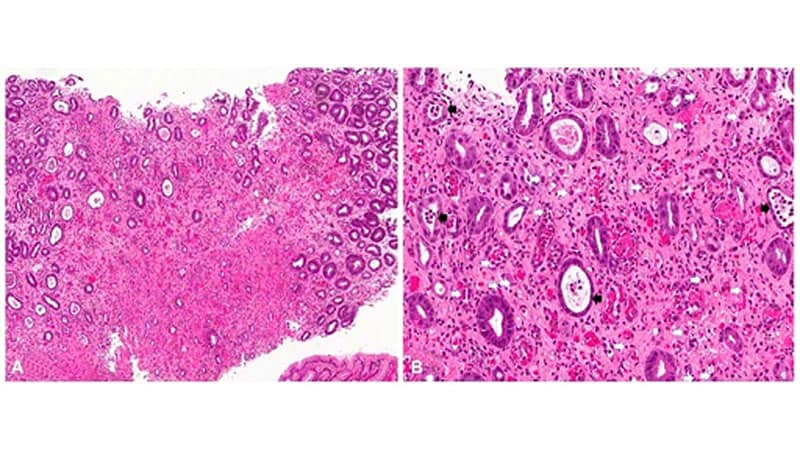TOPLINE:
Benralizumab, an eosinophil-depleting monoclonal antibody, induces histologic remission in patients with eosinophilic gastritis, but persistence of other disease features suggest coexisting eosinophil-independent pathogenic mechanisms.
METHODOLOGY:
-
Investigators conducted a single-site, double-blind, placebo-controlled phase 2 trial.
-
The trial include 26 patients (mean age, 19 years; 73% male) with active eosinophilic gastritis. Participants were randomly assigned (1:1) to receive benralizumab or placebo via subcutaneous injection once every 4 weeks for 12 weeks.
-
The primary endpoint was the proportion of patients who achieved histologic remission (gastric eosinophil count <30 eos/hpf) at week 12.
-
Key secondary endpoints were changes in eosinophil counts, histology scores, endoscopic severity, and patient-reported symptoms.
TAKEAWAY:
-
At week 12, 10 of 13 patients who received benralizumab achieved histologic remission, vs 1 of 13 patients who received placebo (P = .0010).
-
Despite the depletion of eosinophils in blood and gastric tissue, key signs and biomarkers of disease persisted. Benralizumab had minimal effect on structural histologic abnormalities, endoscopic severity, pain, and quality-of-life scores.
-
Broader targeting of type 2 immunity may be necessary for effective management of eosinophilic gastritis.
IN PRACTICE:
“Our findings suggest that the mechanisms driving this disease are in large part independent of excessive eosinophil production. That means our attention should turn towards other therapeutic targets to find curative treatments and that who we define remission for this disease should be reconsidered,” author Marc Rothenberg, MD, PhD, with Cincinnati Children’s Hospital, said in a news release.
STUDY DETAILS:
The study was led by Kara L Kliewer, PhD, of Cincinnati Children’s Hospital Medical Center. It was published online June 16 in The Lancet Gastroenterology and Hepatology. The study was sponsored by AstraZeneca and National Institute of Allergy and Infectious Diseases.
LIMITATIONS:
Limitations include a small sample size, single-center study, and short 12-week double-blind period.
DISCLOSURES:
Several authors have disclosed relationships with AstraZeneca and other pharmaceutical companies.
For more news, follow Medscape on Facebook, Twitter, Instagram, and YouTube.
Source: Read Full Article
